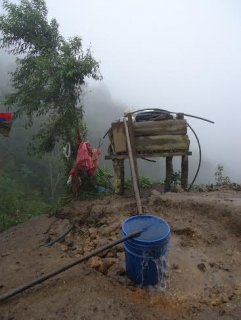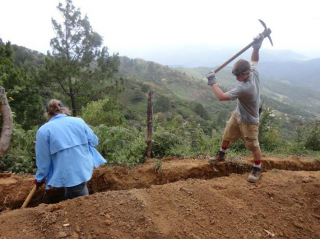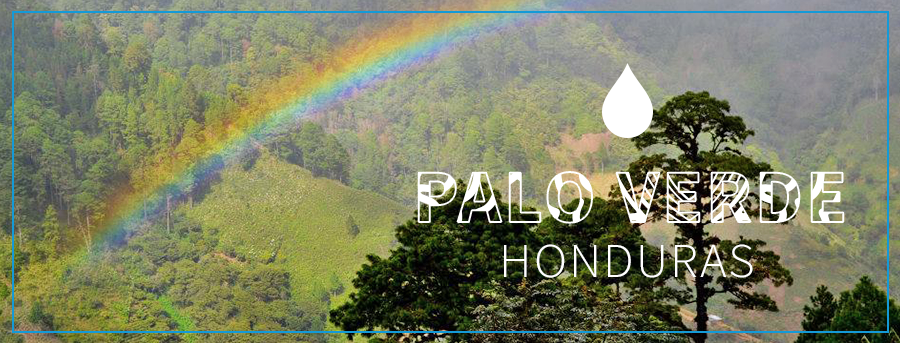
About Palo Verde
Palo Verde is a rural community in the mountains of the municipality of
Cantarranas. It is a "Caserio" of El Zurzular, a community where
Global Brigades has implemented its holistic development model and
continues to do Medical Brigades. A caserio is a group of houses
located near a larger community or town. Compared to the town they
pertain to, caserios do not typically have the same level of access to
services such as healthcare, education, transportation, etc. Palo Verde
is located at a very high elevation and is often literally in the clouds.
People in Palo Verde suffer from lack of proper water, hygiene and
sanitation infrastructure, healthcare, and education. Few homes have
concrete floors, properly functioning latrines, proper water storage, or
efficient stoves with chimneys. The closest health center is also in the
town of El Zurzular, which can be up to a two hour walk away. Some
homes have benefited by a recent solar panel project providing them
with electricity. School is offered until 6th grade and many children
begin to work in agriculture after completing school to help support
their families. Children in Palo Verde who choose to continue with
their education have access to secondary school in El Zurzular. The
main income source fr community members in Palo Verde is agriculture
with coffee, beans, and corn being the most common crops. Through
the sale of these crops, families garner roughly 1,600 Lempiras ($80.00)
per month.
Palo Verde's Water Challenge
Palo Verde did not have a water system. Some community members obtained water by connecting hoses to small, contaminated water sources. Others, namely women and children, walked to nearby water sources and lugged buckets of water to their homes. The type of water source (spring, stream, puddle, hand well) and distance to the source varied depending on the season as many sources dry up during the dry season. Thus, practicing proper sanitation and hygiene was difficult for community members due to a low quantity of water in their homes. Furthermore, there was no central way for the community members to treat their water. After discussions with community members, it appeared that very few people treat their water in their homes. Those who treated their water typically used chlorine or boiled their water.
As a small caserio, Palo Verde received little attention from the local government of San Juan de Flores. After Water Brigade's first visit to the community it was clear that neither the government nor any other organization had any pending plans to address the water problem in Palo Verde. The community did not have a Water Council nor a Basic Sanitation Committee and members did not pay any fee for their water.
| Project Overview | |
| Beneficiaries | 250 |
| Volunteers | 103 |
| System Type |
Gravity |
| Project Cost |
$14,200 |
| Pipes Installed |
7,688 m. |
| Hours of Education |
18 |
| Storage Tank Volume |
5,000 gallons |
| Additional Information |
| General Community Profile |
| Water Methodology |
| Pre-Brigade Lesson Plans |
| Education Profile |
| Water Project Final Report |
| Follow-up Report 07/31/2014 |
The Water Solution for Palo Verde
Water Brigaders from nine different universities worked in Palo Verde in
March 2012. During that time, these volunteers worked with community
members to:
• Construct a new dam and raise a fence to protect it
• Construct a 5,000 gallon tank with chlorinator
• Dig 7,688 meters of trench and install pipeline
• Connect 30 houses and 1 school to the system
• Supply each house with a water storage bucket
• Provide educational seminars to children in the community
on waterand health related topics
 To ensure the sustainability of the project, a new nine member Water Council and a Basic Sanitation Committee were established and trained by Water Brigades. Two community plumbers were also identified and trained to maintain the new system.
To ensure the sustainability of the project, a new nine member Water Council and a Basic Sanitation Committee were established and trained by Water Brigades. Two community plumbers were also identified and trained to maintain the new system.
The community of Palo Verde greatly enjoyed working alongside student volunteers to construct their water system. There was significant community participation throughout the process. In addition to the
thirty families that earned their connection through their work on the project, ten families and young adults volunteered in order to secure a connection when they move to their own homes in the future. Such forward thinking ensures that they will have access to clean water when they marry in the coming years.
| Water Brigades Chapters that Worked in Palo Verde |
||
| Water Brigades Chapter | Month | Volunteers |
| Penn State | March 2012 | 25 |
| Texas A&M | March 2012 | 11 |
| University of Arizona | March 2012 | 12 |
| UC Davis | March 2012 | 13 |
| Washington University in St. Louis | March 2012 | 10 |
| Indiana University | March 2012 | 9 |
| UNC Chapel Hill | March 2012 | 8 |
|
University of Southern California |
March 2012 | 8 |
|
Northwestern University |
March 2012 | 7 |
Current Status
Last Visit: July 31, 2014
Global Brigades' summer interns and the Water Team traveled to Palo Verde on July 31, 2014. They discovered that they system is only need a few slight repairs. However, they also discovered that the Water Council is no longer fulfilling its obligations. They are not chlorinating the water, most likely to protect their coffee beans. They are not charging the obligatory water fee either. Thus, there is no money for needed repairs to the system.
Visit Other Programs in Palo Verde
Global Brigades strives to implement a model of Holistic Development in communities through a system of collectively implementing health, economic, and education initiatives to strategically meet a community's development goals. Learn more about the other programs being implemented in Palo Verde:
![]() Medical
Medical![]() Dental
Dental![]() Engineering
Engineering ![]() Microfinance
Microfinance![]() Public Health
Public Health![]() Business
Business![]() Architecture
Architecture![]() CHW
CHW
